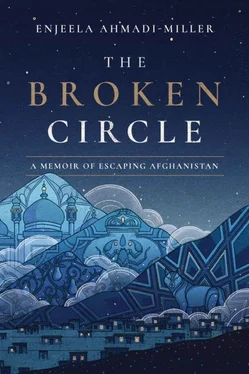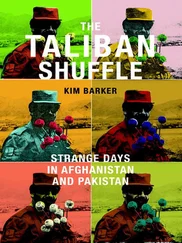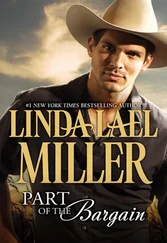They were married in 1956, and true to tradition, Padar’s family threw an elaborate engagement party, at least what was elaborate for their time and place. The Ahmadis were by no means wealthy, not like Mommy’s family, but they weren’t poor. And so, to the question of love, Mommy more than likely went into the relationship knowing that she would have to learn to love her husband over time. And she did in her way.
Padar never lost the sparkle in his eye for Mommy. He worked hard to please her, holding down two jobs for most of his working life in Afghanistan, both at the American embassy and as a landowner.
By the time I was born in 1975, Padar had become a prosperous owner of both homes and farmland, which he owned in partnership with his brother. They hired farmers, who became like family, and his warehouse in Kabul, which I went to with him often as a little girl, was stacked to the rafters with potatoes, corn, and other foodstuffs that were sold to local markets.
For his large family of eight children and his fashionable wife, he built the single-story rambling house in the prestigious Karte Seh neighborhood. The home sat on several acres, with a gated courtyard in front, and grass and flowers beside the driveway. Mother was proud of her home, and while it wasn’t the biggest or most elaborate in the area, she had decorated it beautifully, with taste and a sense of fashion. Padar’s contacts at the embassy used to allow employees to order furniture from America several times a year. Every room of our house was furnished with American and Italian goods. The gourmet kitchen, where Noor, our family cook of many years, held court, playing his favorite Indian music while he cooked, connected to the dining room, for which Mommy had purchased an elaborate cherry wood table. We each had our own bedrooms with American mattresses and beds from Italy. And Padar had a study filled with books.
It was in this house on Shura Street where all of my happiest memories of Afghanistan were nurtured. It was a home filled with beauty and fun and love that I held close to me as a promise of my future. The life I lived there has never left me—it’s planted so deep in my soul, it’s as much a part of me as the blood in my veins. I learned to dream there. I also learned that not all the good dreams come true. My search for love and hope would be a long one.

Padar was a proud man, a strong man, a brave man who loved his family and built us a beautiful life because he believed it was his duty as a husband and as a Muslim. I also think he did all of this out of his love for Mommy because he knew she wouldn’t be happy without the finest things. I learned from him in those days that it was possible to be a man of duty and of love. His Islamic faith required him to be as generous as he was exacting. And I observed him on many occasions practicing the generosity that was central to his religion. All of his children attended school, and there was never a question whether we would be able to go. We were required to wear uniforms and purchase books and supplies. While schools were open to everyone in those days, not everyone could afford the cost of attendance. He was a most generous man, and he often helped children of relatives or of household servants attend school. He was as fastidious as my mother was fashionable. He always wore a dark suit, white shirt, and tie. On nearly every occasion, even if he took us to the carnival during Eid al-Fitr, he dressed up, if not in a coat and tie, in slacks and a shirt.
Padar was my first teacher. At dinner he would tell us stories from the Quran. When I drove with him in the car on errands, he would always tell me how we were to treat others as Muslims.
“Never do anything to hurt your neighbor,” he said to me. It was the way he conducted his business, treated his tenants, and treated us. He told me often that Muslims don’t hurt other people, either in business or their bodies. He taught me to practice my religion in action—not just in thought. He was adamant that a true Muslim didn’t kill other people in order to force their religion on them or hurt other people in a business or personal dispute.
Mommy taught us how to say our prayers, how to celebrate the Muslim holidays, how to fast and pray, how to dress and behave as Muslim women. But Padar taught me how to treat people correctly—never harm your neighbor.

I didn’t think much about college or the fact that my parents told me that I could study anything I wanted: the terms “doctor,” “lawyer,” and “teacher” were always mentioned, but I had no idea at my age what those people even did. If I had any ideas at all, I wanted to be like Padar, a businessman. Mother talked a lot about her sisters’ successful business, how they traveled the world looking for rugs, and about their trips through Europe. I could easily understand business—selling rugs like my aunts or owning houses and land like Padar. Every time I drove through town with him to collect rents from his tenants, I enjoyed watching through the window all the shops full of expensive clothes and goods, the busy bazaars, and restaurants filled with Kabuli eating and talking and enjoying themselves. People were busy; Kabul was exciting. I wanted to be part of this wonderful life, and running a shop or a restaurant or buying houses and land didn’t at all seem out of reach for me. It all seemed possible.
I could become anything I desired. This was freedom.
At day’s end, when Padar came home from the embassy with snacks or treats or gifts, he would settle into the family room with a drink and a cigarette and call my sisters and brothers in. They would have to read their homework to him. If they didn’t have it finished or if they couldn’t answer his questions, he’d get very impatient. I hadn’t started school yet, but when I did I had no intention of being embarrassed like this. Learning was a part of growing up, and I intended to give a lot of attention to it.
My mother, Miriam, was a Muslim, and she was a modern woman. Her wealthy family had used the decade of democratic reforms in the late sixties and early seventies to help build a prosperous and free country. Though she was a Siddiqui—an ancient family that traced its ancestors back to a relative of Muhammad, Abu Bakr—she had stopped wearing the veil when she was a young girl after Queen Humaira appeared in public without one in 1959. She had taken this courageous act to encourage Afghan women to modernize. Women were unveiling, stepping out of the home, and taking part in society, though they were still Muslim in spirit and practice. The years between 1965 and 1978 were the times of the greatest democratic and modern reforms in the history of Afghanistan. Mother always talked about the freedom we had under King Zahir Shah and then President Daoud Khan. She took up with the times and thrived in so many ways. She wore leather pants to prove it. She also wore silk blouses and high heels and curled her black hair every day.
She kept a beautiful house while raising eight children. She taught us about our faith, constantly telling us stories of the Prophet, of the end of the world according to the Quran, and of how we were to behave as Muslim women. But she also told us that we were free to have the lives we wanted to have.
“You don’t have to marry if you don’t want to,” she said to me and my sisters one day.
“What?” my sister Laila said. “We don’t need husbands?”
Читать дальше













